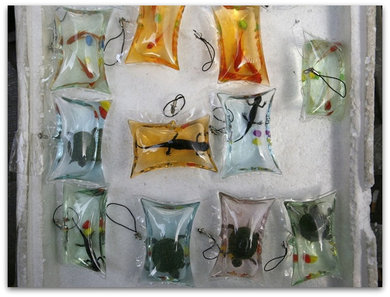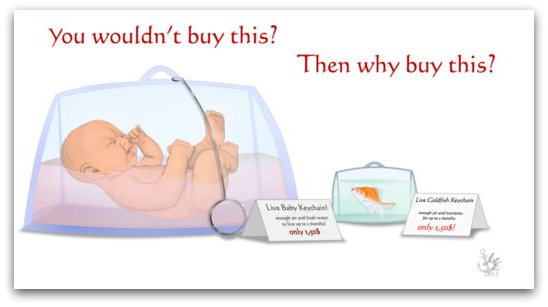
When most people think of the three words “animal” and “key chain” together, they think of a harmless key chain that might have an animal painted on plastic, or even a small, three-dimensional figurine of an animal. However, in China, there has been a trend of sealing small creatures--such as fish, lizards, and turtles--in plastic pouches filled with a colored fluid and selling them as keychains. The fluid is usually packed full of nutrients, but after a few days, the animal usually suffocates.
Where Are These Sold?
These key chains are sold by street vendors in China--and sometimes at subway stations--usually to tourists and children. The key chains generally get sold around $1.50 for one, but the price tends to vary depending on the vendor selling them.
How Are They Viewed By the Natives?
As there are still businesses manufacturing these key chains, the vast majority of natives aren’t bothered enough to take serious actions. For the native children in China, purchasing and owning one of these portable torture chambers may not seem wrong at all, and might be the equivalent of a child owning and caring for a betta fish in another country.
There are many customers who purchase the key chains for the sole purpose of freeing the animals, while there are still other customers who purchase them for “good luck” or simply for entertainment purposes. Currently, the only law to protect animals in China only protects “Wild Animals”, which don’t include the creatures trapped in the key chains. This shouldn’t be surprising, as a lot of farms exist in China for the fur industry (specifically tanuki fur farms). There are groups of animal rights activists that are attempting to change this issue in China, but they don’t have a law to back their petitions.
What Actions Can Be Taken?
Some basic actions that can be taken include signing various petitions online for banning these abusive accessories. Also, awareness can be raised about these key chains to get more people to sign the petitions. Here are some links for petitions:
These key chains are sold by street vendors in China--and sometimes at subway stations--usually to tourists and children. The key chains generally get sold around $1.50 for one, but the price tends to vary depending on the vendor selling them.
How Are They Viewed By the Natives?
As there are still businesses manufacturing these key chains, the vast majority of natives aren’t bothered enough to take serious actions. For the native children in China, purchasing and owning one of these portable torture chambers may not seem wrong at all, and might be the equivalent of a child owning and caring for a betta fish in another country.
There are many customers who purchase the key chains for the sole purpose of freeing the animals, while there are still other customers who purchase them for “good luck” or simply for entertainment purposes. Currently, the only law to protect animals in China only protects “Wild Animals”, which don’t include the creatures trapped in the key chains. This shouldn’t be surprising, as a lot of farms exist in China for the fur industry (specifically tanuki fur farms). There are groups of animal rights activists that are attempting to change this issue in China, but they don’t have a law to back their petitions.
What Actions Can Be Taken?
Some basic actions that can be taken include signing various petitions online for banning these abusive accessories. Also, awareness can be raised about these key chains to get more people to sign the petitions. Here are some links for petitions:
Works Cited:
Kaushik. "Live Fish and Reptiles Sold as Keychains in China." Amusing Planet. Amusing
Planet, 12 Apr. 2011. Web. 10 July 2015.
<http://www.amusingplanet.com/2011/04/live-fish-and-reptiles-sold-as.html>.
Klonoski, Brian. "Chinese Vendors Sell Live Fish and Turtles as Key Chains." RYOT News.
RYOT Corp, 26 Mar. 2013. Web. 09 July 2015.
<http://www.ryot.org/photos-chinese-vendors-sell-live-fish-and-turtles-as-key-chains-fyi-they-make-great-snacks/110385>.
Staff and Agencies. "Crazy World: Live Animals in Keychains." Emirates 24|7. Dubai Media, 11
Apr. 2011. Web. 09 July 2015.
<http://www.emirates247.com/offbeat/this-is-life/crazy-world-live-animals-in-keychains-2011-04-11-1.379602>.
Snopes Staff. "Shell Shock." Snopes.com. Urban Legends Reference Pages, 22 Mar. 2015. Web.
09 July 2015. <http://www.snopes.com/critters/crusader/keyrings.asp>.
Kaushik. "Live Fish and Reptiles Sold as Keychains in China." Amusing Planet. Amusing
Planet, 12 Apr. 2011. Web. 10 July 2015.
<http://www.amusingplanet.com/2011/04/live-fish-and-reptiles-sold-as.html>.
Klonoski, Brian. "Chinese Vendors Sell Live Fish and Turtles as Key Chains." RYOT News.
RYOT Corp, 26 Mar. 2013. Web. 09 July 2015.
<http://www.ryot.org/photos-chinese-vendors-sell-live-fish-and-turtles-as-key-chains-fyi-they-make-great-snacks/110385>.
Staff and Agencies. "Crazy World: Live Animals in Keychains." Emirates 24|7. Dubai Media, 11
Apr. 2011. Web. 09 July 2015.
<http://www.emirates247.com/offbeat/this-is-life/crazy-world-live-animals-in-keychains-2011-04-11-1.379602>.
Snopes Staff. "Shell Shock." Snopes.com. Urban Legends Reference Pages, 22 Mar. 2015. Web.
09 July 2015. <http://www.snopes.com/critters/crusader/keyrings.asp>.



 RSS Feed
RSS Feed
